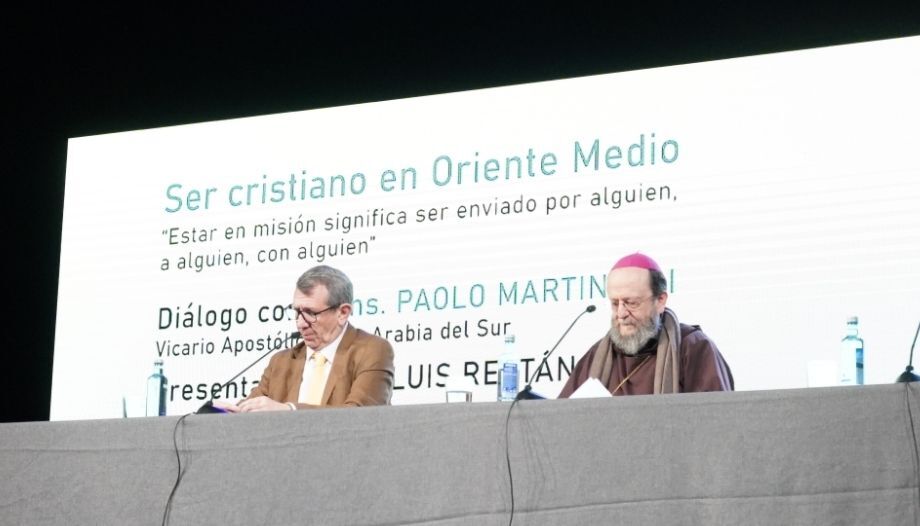At the age of 66, the Italian Paolo Martinelli shows the drive of a young man in his twenties. He has just preached this week the spiritual exercises to the priests of Communion and Liberation in Spain, and he is in great spirits.
Martinelli went from being auxiliary bishop of Milan (2014) to vicar of the ecclesiastical jurisdiction of South Arabia (2022), with almost one million Catholic faithful, coming from more than a hundred countries, 65 priests, 50 religious sisters. "South Arabia is a church of migrants," he says.
"Even the bishop is a migrant"
Eighty-five percent are of the Latin rite, and 15 percent are from Eastern Catholic churches. "We are all migrants, even the bishop is a migrant," he said in Madrid. In fact, some hundreds of people from Communion and Liberation listened to him and applauded enthusiastically in the space of the Paul VI Foundation, and who knows if he stuck the missionary harpoon into more than one attendee.
On the poster, under the title of the colloquium with José Luis Restán ('Being a Christian in the Middle East'), there was a phrase of his, which he later developed: "Being on mission means being sent by someone, to someone, with someone".
From the city to the desert
Martinelli went from the city to a desert with gigantic and intelligent infrastructures, surrounded by migrants. A unique place also from an environmental point of view, the desert. "I was followed by a few friars, and 42 degrees in the shade." And he concluded by saying that southern Arabia is a "laboratory for the future of the Church".
"My predecessor (Paul Hinder, who was 80 years old, 20 years in the Gulf), was also a Capuchin, three quarters of the clergy are Capuchins (45 out of 65 priests), and not a few of them had been my students in Rome. I realized that my Order has been committed to this land since the first half of the 19th century". That is why, the bishop there has almost always been a Capuchin. "This election of Pope Francis was fulfilling something that was written in my life. I came to Arabia because I was sent to Arabia."
UAE: 7 emirates with 9 million migrants
The United Arab Emirates (UAE), center and seat of the vicariate, is constituted by the union of 7 emirates, since 1971. The state is officially Islamic. The president is the emir of Abu Dhabi, which has ten million inhabitants, of whom 9 million are migrants: 4.5 million are Indians, and apart from Islam, there are Christians, Buddhists, etc. The countries of origin are almost two hundred, and "in the vicariate we have one million Catholics, of whom 850,000 live in the emirates. Most of them are Filipinos, many Indians and from other countries", he explained in the colloquium.
The emirates have had from the beginning a very tolerant attitude towards all cultures and religions. We even have a Ministry of Tolerance and Coexistence, he added.
"It is striking that modernity and tradition coexist peacefully, unlike the occdental situation. The father of the nation was a great visionary, and the development of the country has been very rapid."
"The immigration policy has been very careful. There is an important presence of workers, in various groups. Many arrive without families. The Church tries to have a stable relationship with all of them, promoting initiatives of support and contact with Catholics who wish to live a life of faith."
"The miracle of Dubai".
Bishop Martinelli says, "We have 9 parishes in the various emirates. In Dubai we have the largest parish in the world, with more than 150,000 faithful every weekend. It is a miracle to make it possible for everyone to participate in Mass and catechesis, it is truly a miracle. We are all migrants, a Church in continuous movement, whose organization depends on the work of its faithful, from a hundred countries".
For this reason, he adds, "the parish is structured in linguistic communities, which are the first sign of the Church's closeness to the people. They take care of newcomers, help them to maintain their traditions, their language, etc., to support them in their needs".
"When Pope Francis visited the United Arab Emirates, said that the vocation of this church is to be "a polyphony of faith". This is the way to experience the true universality of the Church. Being different, we have received the same Baptism, the same Faith, the same Spirit".
"It is Christ who sends"
What does it mean to be sent? "On the plane, I reflected: mission means that someone sends you. It is Christ who sends. Jesus said: as the Father has sent me, so I send you. Through someone, through the Church, through the Pope, through a call you receive unexpectedly".
"Then I thought, I am not going alone. I go with someone, the subject of the mission is always a Communion, with my brothers, the priests, it would be impossible to be there alone; it was also a great help to know about some families of the Movement, especially some of them. Memores Dominiare a special gift", and he expressly quoted Giussani.
"And to someone: I am thinking especially of all the migrants who live in the Gulf. Ours is a Church of migrants".
"Being sent makes you love people."
"I am there to confirm them in their faith and to be a sign of unity. At the same time, I recognize that I am sent to the faithful of other religions, especially the faithful of Islam, supported by the example of St. Francis of Assisibut also the Hindus, and so many others," he added yesterday. "To bear witness to the Gospel, to recognize in them the glimmer of that truth that enlightens all men, and to work together for a more fraternal and human world."
In short, "the word mission, the experience of being sent is a principle of action because it moves you, sets you in motion, a principle of knowledge and a principle of affection. Being sent makes you love people".
Yemen: reestablishing the presence of the Church
Three sentences about other countries of the vicariate of South Arabia. First, about YemenFor us it has a fundamental historical importance, because the Apostolic Vicariate of Arabia was born in Yemen 135 years ago and its headquarters was there.
After ten years of civil war, very little remains. The four churches are in ruins, and only in the north, under the command of the Houthi rebels, are there two communities of Missionaries of Charity (St. Teresa of Calcutta), who carry out a great work of charity, and a priest. In 1998 and in 2026, the sisters of Mother Teresa suffered attacks that cost the lives of 7 nuns, martyrs of our time, as Pope Francis defined them.
Only a few hundred Catholics remain. Almost all the migrants have been leaving Yemen. "My greatest wish would be to resume the presence of the Church in Yemen, where there are indigenous Catholics, which is not the case in other Gulf States."
The internal situation between North Yemen and South Yemen "is now quite calm compared to the past. We pray that new avenues of Christian presence will open up, and we hope that the truce between Hamas and Israel can bring some change to Yemen as well."
Good relationship with Oman
The situation in Oman is very different, because violence is rejected, explained Vicar Martinelli. The country is a sultanate and the population is very docile: "They are interlocutors of Yemen, and in any case, our relationship with the authorities of Oman is very good, and that of the nuncio as well. We have 4 parishes, although there are no schools for the moment, and the good relations with the Holy See make us foresee that in the future there could be new parishes, and perhaps some kindergartens".
We think that in Oman there are many Catholics, but they are not involved in the life of the Church, perhaps because of the distance to the places of worship, because they do not have a vehicle, considers the vicar. This is the case of the Filipinos, more than 45,000 in Oman, almost all of them Catholics. There are also Indian Catholics.







